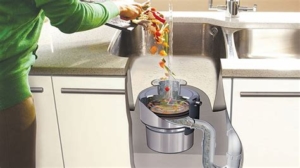Garbage Disposals
What Are Food-Waste Disposers?
Garbage disposals, also called food-waste disposers, are residential appliances designed to shred food waste so that it can fit through plumbing. They are usually electrically powered (although occasionally powered by water pressure) and are installed beneath sinks. As a home inspector, we always inspect this appliance.
Why Use a Garbage Disposal?
When food waste is discarded into the trash, it places an enormous burden on waste-management systems. Garbage disposals reduce the severity of these problems by routing food waste into septic systems or sewers instead of landfills.
Garbage Disposals and Septic Systems
If a garbage disposal discharges into a septic tank, it can place significant strain on the septic system. We really don’t see this in Oklahoma City very much. The amount of waste that enters the tank, particularly grease and suspended solids, will increase considerably. This load increase requires that the septic tank be pumped more often than would otherwise be required. The additional strain will also reduce the lifespan of the septic system. Septic systems can be designed to accommodate food waste, but, in general, they are not.
Electrical Wiring Requirements
- The National Electrical Code (NEC) does not require a garbage disposal to have GFCI protection.
- The vibration caused by the operation of a garbage disposal can cause electrical connections to separate. Check for any loose connections in the wire compartment box at the base of the disposal.
- Garbage disposals should be either hardwired or connected to an outlet through a grounded electrical outlet.
- A dedicated circuit is generally recommended, although a circuit that is shared with a dishwasher is sometimes appropriate. The disposal’s user or installation manual should be consulted.
Precautions for Testing Garbage Disposals:
- To test a garbage disposal for leaks, turn it on and run water through it. The water load should be great enough so that any leaks will become apparent. A good way to do this is to close the drain and fill the sink with water before releasing the stopper.
- While testing a garbage disposal, never put anything other than water through it. Before turning it on, check to make sure there are no objects already in the disposal.
- If a dishwasher is connected to the disposal, make sure that the line that connects them is securely attached.
- Check to make sure that the garbage disposal is connected to a drain that is 1½ inches or greater in diameter.
- Check to make sure that the disposal is provided with an adequate water supply.
- If the home has a double sink, check to make sure the waste pipe from the disposal has a trap installed.
Maintenance and Operation Suggestions:
- Put only small quantities of food into the disposal at a time. Large food scraps should be cut into smaller pieces before entering the disposal.
- Never put anything down the disposal that is not food or water. Bottle caps, aluminum foil, and other non-food items can damage the disposal or get stuck in the plumbing piping.
- Run water while using the disposal and for approximately 30 seconds after you turn it off. Food scraps will flow through the piping more easily if they are pushed along by water. Cold water is better than warm water for this purpose because it will force fats and grease to congeal and harden, allowing them to move more easily through pipes. Warm water can be run through the disposal while it is not in operation.
- Ice can be used to clear off solidified grease and other debris from the blades in a garbage disposal.
The garbage disposal should be used to grind only non-fibrous, leftover food. If in doubt as to whether something can be put in the disposal, err on the side of caution and put it in the trash instead.
The following items should never be put in a disposal:
- items that are hard enough to dull the blades, such as shells from shellfish or bones;
- food that is highly fibrous, such as corn husks, artichokes, pineapples, potato peels, asparagus, or celery, which should enter a disposal only in small quantities or disposed of in the trash. These foods take a long time to grind and can clog the disposal or the plumbing;
- grease and household oils; or
- chemicals.
Garbage disposals have the potential to limit the amount of household trash that must be taken away to waste management facilities. They can also place additional strain on septic systems and, for this reason, they should be used infrequently
Home Run Inspections, LLC
Oklahoma: 405-905-9175
We Cover All the Bases!
Serving: Oklahoma City, Norman, Yukon, Piedmont, Purcell, Bethany, El Reno, Tuttle, Mustang, Moore, Edmond, Midwest City, Del City, Choctaw, McCloud, Shawnee, Harrah, Newalla, Jones, and more.
Schedule Your Inspections Online at:
Like us on FaceBook
Follow us on Twitter
Follow us on Instagram



